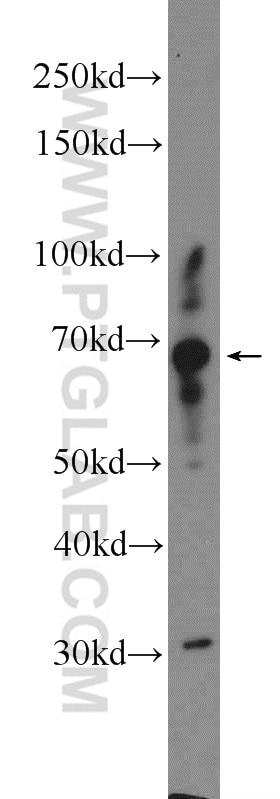Anticorps Polyclonal de lapin anti-CPNE5
CPNE5 Polyclonal Antibody for WB, ELISA
Hôte / Isotype
Lapin / IgG
Réactivité testée
Humain, rat, souris
Applications
WB, ELISA
Conjugaison
Non conjugué
N° de cat : 18097-1-AP
Synonymes
Galerie de données de validation
Applications testées
| Résultats positifs en WB | tissu embryonnaire de souris |
Dilution recommandée
| Application | Dilution |
|---|---|
| Western Blot (WB) | WB : 1:200-1:1000 |
| It is recommended that this reagent should be titrated in each testing system to obtain optimal results. | |
| Sample-dependent, check data in validation data gallery | |
Informations sur le produit
18097-1-AP cible CPNE5 dans les applications de WB, ELISA et montre une réactivité avec des échantillons Humain, rat, souris
| Réactivité | Humain, rat, souris |
| Hôte / Isotype | Lapin / IgG |
| Clonalité | Polyclonal |
| Type | Anticorps |
| Immunogène | CPNE5 Protéine recombinante Ag11987 |
| Nom complet | copine V |
| Masse moléculaire calculée | 593 aa, 66 kDa |
| Poids moléculaire observé | 68 kDa |
| Numéro d’acquisition GenBank | BC053872 |
| Symbole du gène | CPNE5 |
| Identification du gène (NCBI) | 57699 |
| Conjugaison | Non conjugué |
| Forme | Liquide |
| Méthode de purification | Purification par affinité contre l'antigène |
| Tampon de stockage | PBS with 0.02% sodium azide and 50% glycerol |
| Conditions de stockage | Stocker à -20°C. Stable pendant un an après l'expédition. L'aliquotage n'est pas nécessaire pour le stockage à -20oC Les 20ul contiennent 0,1% de BSA. |
Informations générales
Copines are a family of evolutionarily conserved calcium-dependent phospholipid-binding proteins (PMID: 9430674). They contain two Ca(2+)- and phospholipid-binding domains known as C2 domains. Copines are potentially involved in regulating membrane trafficking and in protein-protein interactions. Copine-5 (CPNE5) has been reported to have a potential role in the development of murine central nervous system (PMID: 18614158).
Protocole
| Product Specific Protocols | |
|---|---|
| WB protocol for CPNE5 antibody 18097-1-AP | Download protocol |
| Standard Protocols | |
|---|---|
| Click here to view our Standard Protocols |


